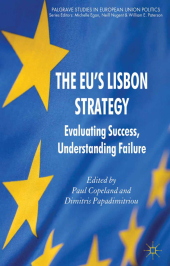 Neuerscheinungen 2012Stand: 2020-01-07 |
Schnellsuche
ISBN/Stichwort/Autor
|
Herderstraße 10
10625 Berlin
Tel.: 030 315 714 16
Fax 030 315 714 14
info@buchspektrum.de |

P. Copeland
The EU´s Lisbon Strategy
Evaluating Success, Understanding Failure
Herausgegeben von Copeland, P.
1st ed. 2012. 2012. xix, 279 S. 216 mm
Verlag/Jahr: SPRINGER PALGRAVE MACMILLAN; PALGRAVE MACMILLAN UK 2012
ISBN: 1-349-34073-1 (1349340731)
Neue ISBN: 978-1-349-34073-6 (9781349340736)
Preis und Lieferzeit: Bitte klicken
How successful was the EU´s Lisbon Strategy? This volume provides the first comprehensive assessment of the Strategy and reflects on its key developments during its 10-year cycle. The volume contains both theoretical and empirical contributions by some of the leading scholars of EU studies across the social sciences.
Introduction; P.Copeland & D.Papadimitriou The Origins and Evolution of the Lisbon Strategy; S.James Governing the Lisbon Strategy: Uncertain Governance in Turbulent Economic Times; S.Bulmer Conceptualising the Lisbon Strategy: Europeanization and Varieties of Capitalism; K.Featherstone, A.Kornelakis & S.Zartaloudis Social Inclusion and the Lisbon Strategy; M.Daly Employment and the Lisbon Strategy; S.Velluti Pensions and the Lisbon Strategy; P.Tinios Healthcare and the Lisbon Strategy; A.de Ruijter & T.K.Hervey Education and the Lisbon Strategy; A.Corbett Research and Innovation and the Lisbon Strategy; J.Edler Economic and Monetary Union and the Lisbon Strategy; K.Dyson & L.Quaglia The Lisbon Strategy and Europe 2020: From the Governance of Coordination to the Coordination of Governance; K.A.Armst rong Conclusion: The Lisbon Strategy: Evaluating Success and Understanding Failure; P.Copeland & D.Papadimitriou
This is a welcome and timely collection that evaluates the impact of the EU´s ´Lisbon Strategy´ over a decade after its inception and at a time of economic turmoil for the EU. The line-up of contributors is impressive and their contributions are individually and collectively well worth reading. They present a convincing assessment of the failures of the Lisbon agenda to deliver on its aims, offering sober reflections on the weaknesses of EU governance in the past, as well as some suggestions for its future strengthening and reform.
Gráinne de Búrca, New York University Law School, USA
This book provides an extensive analysis of the successes and failures of the Strategy by presenting an impressive range of policy areas. From a policy practitioner´s point of view this book is essential reading for anyone wishing to understand both Lisbon and its successor, Europe 2020.
Elisa Roller, European Commission
Bringing together excellent researchers in different policy areas, the book provides an overview of this new form of EU governance architecture that combines open voluntary coordination and the traditional Community method. This is a valuable, competent, and critical study that will certainly become a seminal work in EU studies.
Susana Borrás, Copenhagen Business School, Denmark


